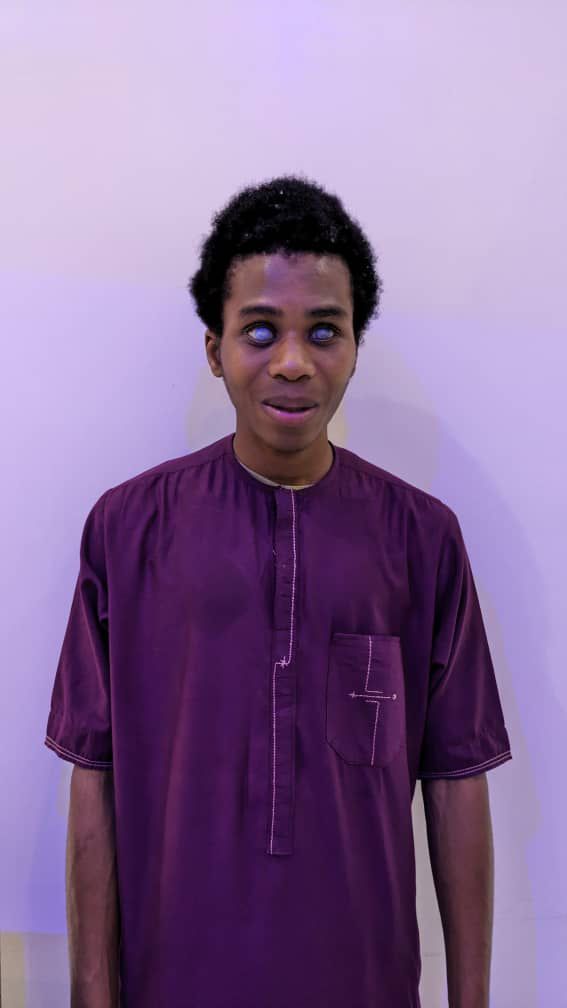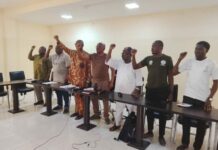Kano blind boy making waves through Indian movie translations
Story by Shafaatu Dauda Kano
In Sharada, a crowded neighbourhood in Kano Municipal, a blind teenager has become a source of fascination for residents—not through sight, but through sound.
Ahmad Aminu Sufi, 19, lost his vision to glaucoma when he was nine. Since then, he has mastered the art of mimicking voices from Indian-Hausa films, a popular form of entertainment in northern Nigeria.
After I became blind, I began to focus more on sounds,” he told CITAD RADIO “I grew up watching Indian-Hausa films with my siblings, and when my vision faded, I paid close attention to the voices. That’s where it all began.
Studios like Algaita Dub Studio have for years produced Hausa-language versions of Bollywood and Telugu films. For Ahmad, they became more than entertainment they became training material.
I can mimic more than ten different voices,” he said. “Men, women, old people, young ones. Once I hear a voice, I can reproduce it. I even mimic the dramatic sound effects in the films.
READ ALSO: Blind teacher overcomes challenges, marries love of his life in Kano
Ahmad has also picked up basic Hindi from constant listening. A Hindi-language radio programme in Kano helped him learn without formal lessons.
“I don’t have access to textbooks in Braille, so I learn by listening, repeating, and recording myself,” he said.
The teenager recently finished his studies at the Special Education School in Tudun Maliki and sat for the 2025 Unified Tertiary Matriculation Examination. He has applied to study Mass Communication at Bayero University, Kano.
“My ambition is to become a journalist and work in broadcasting,” he said. “I want to tell the stories of people with disabilities—people whose voices are often ignored.”
But his path is not without challenges. Without assistive devices, Ahmad relies on borrowed tools and help from his younger siblings.
READ ALSO: WUCOBA commends Kano government, urges action on Wudil commercial school
I wish I had a screen reader, a digital voice recorder, a smartphone, even a typewriter. These tools would help me learn better,” he said.
In his neighbourhood, he is known as “India Boy.” Crowds gather to hear him switch between voices. One popular act is a scene from Baazigar, where he mimics both Shah Rukh Khan’s character and the mother figure.
“When people laugh or clap after I perform, I feel like I’m doing something valuable. I may not see, but I hear and feel everything,” he said.
His story reflects wider struggles faced by people with disabilities in the region, many of whom lack access to education or skills training.
“We can learn, we can create, we can inspire,” Ahmad said. “All we need is support and encouragement.
READ ALSO: Haske Children Foundation organises free medical outreach for disabled Kaduna children
A family member said his determination stood out. “Even after losing his sight, he kept pushing himself. He kept listening and talking. Now he can do what many never expected,” the relative said.
Ahmad hopes for help from individuals and organisations willing to provide the tools he needs to continue his education and develop his talent.
“I just need the right tools. With God’s help, I believe I will make it,” he said.
As Indian-Hausa films continue to find audiences in northern Nigeria, Ahmad dreams of one day lending his own voice to the productions that shaped his childhood.
“I believe disability is not inability,” he said. “If you can hear my voice, then I’m already halfway to my dream.”
Follow the Neptune Prime channel on WhatsApp:
Do you have breaking news, interview request, opinion, suggestion, or want your event covered? Email us at neptuneprime2233@gmail.com





